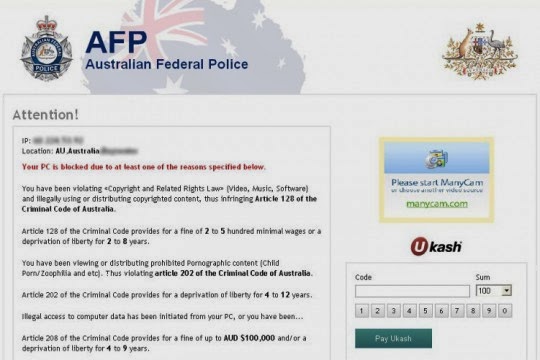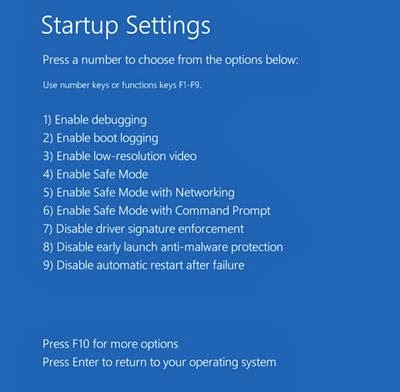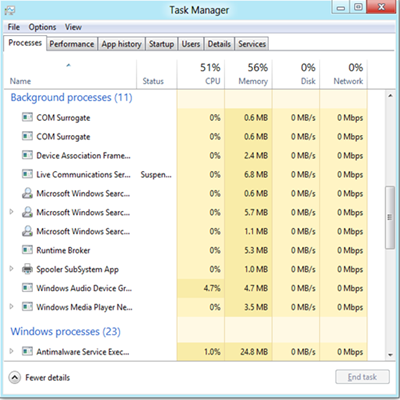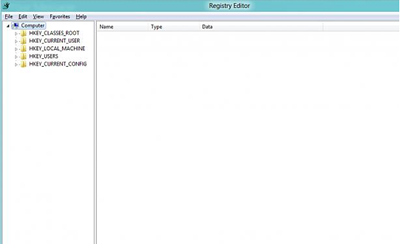Basic Symptoms of AFP virus
- Slow PC performance and speed
- Spontaneous system reboots
- Annoying popups and alerts during Internet access
- Blue Screen of Death error
- Redirecting web browser to malicious websites
- Recording user's Internet surfing and keystrokes
Overview of AFP Scam

AFP virus (or Australian Federal Police virus) is a hazardous PC locked virus or ransomware infection that developed by cyber criminals for data kidnapping. Once being infected with such kind of malware, it will utilize its advanced screen locker techniques to make a victim’s computer inaccessible while popping up a fake alert on the monitor, claiming that the computer has been locked according to the illegal behaviors caused by users. The bogus notification pretends to be from the local law enforcement agencies, such as International Cyber Security Protection Alliance, attempting to convince victims to believe in its authenticity. To release locked computer and avoid further punishment, the AFP virus will threaten users to pay a concoctive fine through Ukash or other online payment system.
However, the truth is, AFP virus has nothing to do with the legitimate government organization, and comes out a hack tool used by attackers for criminal extortion. Thus, computer users who are suffering from this type of malware should never spend needless money on AFP scan on order for the restriction to be removed. Supposed that the AFP ransomware cannot be removed from computer timely, it may even take advantage of found system loopholes to install additional threats onto compromised machine. In worse cases, this type of malware may also open a backdoor for remote hacker, allowing them to access targeted machine freely and do whatever they want. Without any doubts, computer users are obliged to remove AFP virus from computer as long as being informed of its presence.
Why does Antivirus Fail to Remove AFP Scam?
To get rid of AFP virus, major computer users attempt to remove it with their installed antivirus applications, but still failed. Well That’s because the security removal tools are not human beings and they cannot catch all the new things. They need to update their functions from time to time to catch the newly released viruses. However, it seems that the infections’ creators know about this and they design all the related files of the viruses in random names. What’s worse, the pests can mutate at a fast speed. Thus, your antivirus cannot remove AFP virus completely. The most effective way to get rid of AFP virus is the manual removal. Here is a guide for you.
How to Remove AFP Virus (Manual Removal)
1. Safe Mode with Networking
Boot your computer into safe mode with networking by restarting your computer and keeping pressing F8 key and then using arrow key to get into that mode.

- Press Ctrl+Alt+Del while the PC is starting up, then Press Shift key and click ‘shut down’ icon. After that, click restart and go to the ‘Choose An Option’ screen.
- Choose ‘Troubleshoot’> ‘Advance Options’> ‘Startup settings’>‘Restart’
- cThen choose ‘Enable Safe Mode with Networking’


3. Open Registry Editor (in Windows XP, go to Start Menu, run, type in “Regedit” and press OK; in Windows 7, Windows Vista & Windows 8, go to Start menu, Search, type in “Regedit”), find out the following AFP virus registry entries and delete:

HKEY_LOCAL_MACHINE\SOFTWARE\Microsoft\Windows NT\CurrentVersion\Winlogon\
HKEY_CURRENT_USER\Software\Microsoft\Windows\CurrentVersion\Run\random
4. The associated files to be removed in folders on Local Disk (note: new files are still created each month so far):
%Temp%\[RANDOM CHARACTERS].exe
C:\Documents and Settings\<Current User>
C:\Users\<Current User>\AppData\
Tips for Preventing AFP Virus
- Use a firewall to block all incoming connections from the Internet to services that should not be publicly available. By default, you should deny all incoming connections and only allow services you explicitly want to offer to the outside world.
- Enforce a password policy. Complex passwords make it difficult to crack password files on compromised computers. This helps to prevent or limit damage when a computer is compromised.
- Ensure that programs and users of the computer use the lowest level of privileges necessary to complete a task. When prompted for a root or UAC password, ensure that the program asking for administration-level access is a legitimate application.
- Disable AutoPlay to prevent the automatic launching of executable files on network and removable drives, and disconnect the drives when not required. If write access is not required, enable read-only mode if the option is available.
- Turn off file sharing if not needed. If file sharing is required, use ACLs and password protection to limit access. Disable anonymous access to shared folders. Grant access only to user accounts with strong passwords to folders that must be shared.
Note: The posted instruction is recommended for advanced users only. A trying without any expertise will be at your own risk. If you need any help during the operation, you are welcome to contact VilmaTech 24/7 Online Experts for help to resolve your problems properly and completely.


Are you willing to know who your spouse really is, if your spouse is cheating just contact cybergoldenhacker he is good at hacking into cell phones,changing school grades and many more this great hacker has also worked for me and i got results of spouse whats-app messages,call logs, text messages, viber,kik, Facebook, emails. deleted text messages and many more this hacker is very fast cheap and affordable he has never disappointed me for once contact him if you have any form of hacking problem am sure he will help you THANK YOU.
ReplyDeletecontact: cybergoldenhacker at gmail dot com